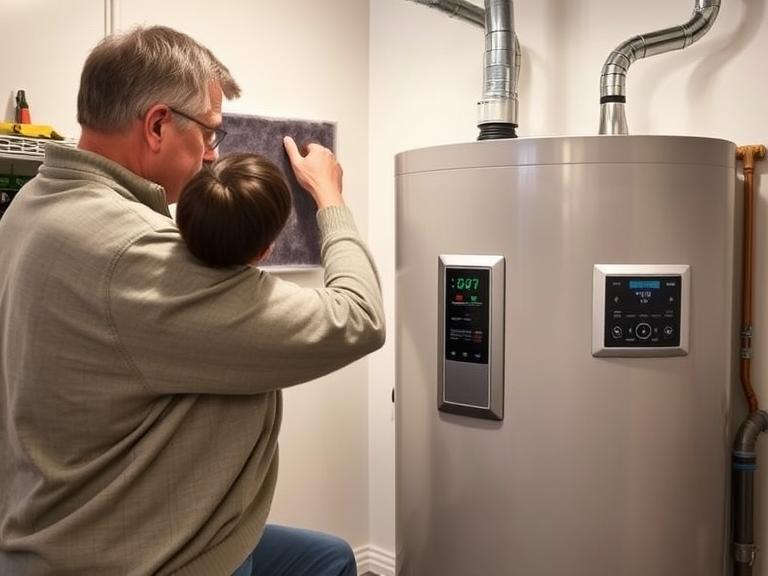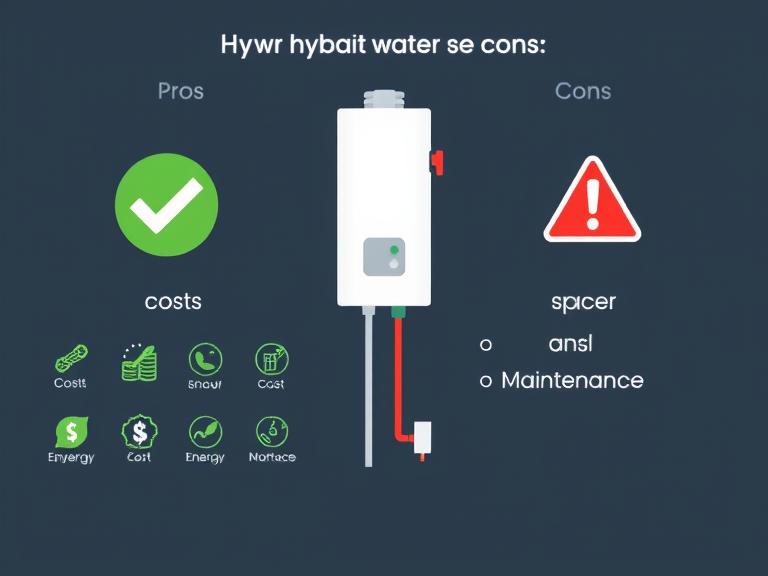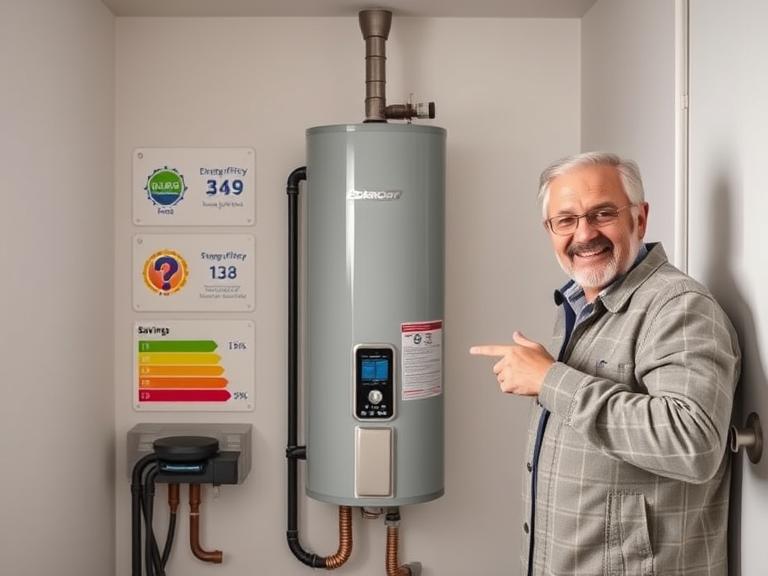Hybrid Water Heaters: Pros and Cons Explained
Hybrid water heaters, sometimes referred to as heat pump water heaters, are becoming more and more common as homeowners place a higher value on the energy economy. Are they, however, the best option for your house? We’ll go over the benefits and drawbacks of hybrid water heaters in this article so you can make an informed choice with assurance.
What Is a Hybrid Water Heater?
The technologies of a heat pump and a conventional electric water heater are combined in a hybrid water heater. It is far more energy-efficient since it harnesses heat from the surrounding air to heat water rather than producing heat directly.
Pros of Hybrid Water Heaters
1. Energy Efficiency and Cost Savings
Compared to conventional electric water heaters, hybrid ones can be up to three times more efficient. They can save annual energy expenses for a normal household by hundreds of dollars, according to Energy Star.
2. Environmentally Friendly
Greenhouse gas emissions are reduced when energy use is reduced. Investing in a hybrid heater is a wise move if you want to lessen your carbon footprint.
3. Longer Lifespan
The majority of hybrid water heaters have warranties ranging from 10 to 15 years, which is frequently longer than those of conventional versions.
4. Built-in Smart Features
Numerous versions offer convenience and control directly from your smartphone with features like Wi-Fi controls, energy usage tracking, and customisable settings.
5. Rebates and Tax Incentives
Installing energy-efficient appliances, such as hybrid heaters, can result in rebates or federal tax credits from numerous states and local utilities.
Cons of Hybrid Water Heaters
1. Higher Initial Cost
Hybrid units are substantially more expensive than conventional electric devices, with prices ranging from $1,200 to $3,500. Additionally, installation expenses could be higher, particularly if adjustments are required.
2. Space Requirements
They are less suitable for cramped interior spaces or small closets since they need more room for installation and ventilation.
3. Cooler Ambient Air
They can somewhat cool the space because they draw heat from the surrounding air, which might not be the best option in colder climes or small confined spaces.
4. Slower Recovery Time
In comparison to gas versions, the recovery period could be longer if there is a strong demand for hot water, like in large families.
5. Maintenance Needs
Unlike simpler traditional types, hybrid systems feature electronic components and filters that need to be maintained on a regular basis.

Frequently Asked Questions (FAQs)
Q1: How long do hybrid water heaters last?
A: Usually 10 to 15 years with good care.
Q2: Do hybrid water heaters work in cold climates?
A: Although they are less effective in colder climates, they can still function effectively in utility rooms that are insulated or inside.
Q3: Can I replace my traditional heater with a hybrid model?
A: Yes, although professional installation and space changes could be required.
How Hybrid Water Heaters Compare to Other Types
When choosing a water heater, it’s important to compare hybrid models with other popular types:
Hybrid vs. Electric
- Energy Use: 60–70% less electricity is used by hybrid vehicles.
- Cost: Higher initial outlay but less energy costs over time
- Maintenance: More intricate systems require more care.
Hybrid vs. Gas
- Installation: Homes without gas lines can more easily accommodate hybrid models.
- Efficiency: Unless you live in an extremely cold area, hybrid models are typically more efficient.
- Emissions: Carbon is released by gas heaters but not by hybrids..
As compare to Tankless
- Hot Water Supply: Hybrids can only store a certain amount of hot water, while tankless systems provide endless supply.
- Both are expensive up front, but installing tankless units typically costs more.
- Efficiency: Both are energy-efficient, but for different reasons: hybrids recycle heat, whereas tankless systems heat as needed.
Tips for Maintaining a Hybrid Water Heater
Maintaining your hybrid water heater can guarantee its longevity and best performance.
1. Clean the Air Filter
To maintain consistent and effective airflow, check and clean the air filter every three to six months.
2. Flush the Tank Annually
Efficiency may be lowered by sediment accumulation. Performance can be maintained by flushing the tank once a year.
3. Inspect the Anode Rod
To prolong the heater’s life and stop tank corrosion, check the anode rod every two to three years.
4. Schedule Professional Service
Every one to two years, have the system inspected by a qualified specialist to guarantee optimal performance and spot problems early.

1. Location Matters
- Hybrids require a lot of airflow. Among the best places are basements.
- Garages
- At least 1,000 cubic feet of air space in utility rooms
2. Ambient Temperature
They function best in regions with year-round temperatures between 40 and 90 degrees Fahrenheit. Locations that are really cold may be less efficient.
3. Drainage Requirement
A condensate pump or floor drain must be close by since hybrid water heaters generate condensation.
4. Electrical Requirements
Make sure the item is compatible with your electrical system; most need a 240-volt outlet.
Are Hybrid Water Heaters Right for Your Climate?
Climate has a significant effect on performance because hybrid heaters use the air around them to generate heat.
Warm Climates (Best Fit)
- Year-round high efficiency
- Perfect for tropical areas or Southern U.S. states
Moderate Climates (Good Fit)
- performs well in enclosed interior environments.
- Suggested for use from spring until autumn
Cold Climates (Limited Fit)
Poorly insulated or unheated spaces lose efficiency.
Functions best in mechanical rooms or hot basements.
Pro Tip: For backup electric heating in colder climates, look for a hybrid model with a “High Demand” or “Hybrid” mode.
Cost Breakdown: Initial Investment vs. Long-Term Savings
Determining if a hybrid water heater is a wise purchase for your house requires an understanding of the financial component.
Upfront Costs
- Unit Cost: Usually falls between $1,200 and $3,500.
- Installation: Depending on your setup and location, budget between $500 and $1,500.
Long-Term Energy Savings
- Reduce your annual energy costs by $300 to $600 when compared to a conventional electric water heater.
- The payback period typically ranges from three to five years, contingent on utility costs and usage.
Incentives & Rebates
- Up to 30% of the price can be refunded by federal taxes.
- Utility rebates in the area that range from $200 to $800+
Common Myths About Hybrid Water Heaters Debunked
Let’s correct the many misconceptions that exist around hybrid water heaters.
Myth 1: “They Don’t Work in Winter”
Truth: Even in colder climates, they can still function well if placed in enclosed interior areas.
Myth 2: “They Run Out of Hot Water Quickly”
Truth: Hybrid heaters can easily meet the demands of the typical family when the tank size and settings are appropriate.
Myth 3: “They’re Too Complicated to Maintain”
Truth: Like classic versions, regular maintenance is simple and consists primarily of filter cleaning and an annual flush.
Myth 4: “They’re Not Worth the Cost”
Truth: Over time, they are frequently more cost-effective than less expensive versions due to long-term savings, rebates, and incentives.

Final Thoughts: Is a Hybrid Water Heater Worth It?
A hybrid water heater is a great investment if you want long-term savings, energy efficiency, and contemporary features. Over time, the cost might be compensated by the savings on energy bills and potential subsidies, even though the initial cost is higher.
Make sure to take your home’s size, hot water consumption, and available space into account before making a purchase. Hybrid water heaters can provide amazing performance and environmental advantages when put in the proper setting.
